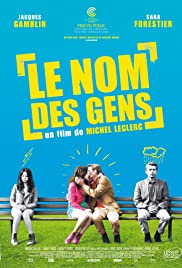
LE NOM DE GENS/ THE NAMES OF LOVE
France, 2010, 100 minutes, Colour.
Jacques Gamblin, Sara Forestier, Zinedine Soualem, Carole Franck, Jacques Boudet, Michelle Moretti,
Directed by Michel Leclerc.
This is a film that needs a French audience. While it is of interest to those not familiar with political life in France at the end of the 20th century, into the 21st century, the story is very much located in its culture.
This is the story of two families. However, the stories emerge as the screenplay focuses on two very distinctive characters. First there is the quiet scientist, interest in birds and diseases, Arthur Martin (which seems to the popular name of appliances in France, everybody remarking on the ordinariness of his name), played by Jacques Gamblin, is interrupted during a television interview about birds by a particularly free and wild spirit, Bahia Benmahmoud, played by Sara Forestier, an absolutely uninhibited attack.
The two continue to encounter each other and the audience learns the background of their families. Arthur has not known that his mother had a Jewish background and that her parents were killed in Auschwitz. She has been very reserved about her family background, but always tense, fearing deportation. She has married an older man – and, throughout the film, whatever his age, the father is portrayed by the older actor, Jacques Boudet. The two tend to be very savvy about engineering and technological developments, making that their focus of communication. The father also served in the war in Algeria.
Bahia, on the other hand, has a French mother who was a rebel, hippy style, in the 1960s, very frank about her views. And she has married an Algerian, a genial man, working on repairs but also an artist at heart – who, at the end, can fulfil his ambitions.
Arthur and Bahia begin a relationship, quite stormy, he rather infatuated with her, she a woman of eccentric principles, campaigning for the left, having sexual relationships and encounters with men from the right so that she can convert them! Her free spiritedness is illustrated throughout the film by her lack of inhibitions in appearing naked.
So, there are various ups and downs in the relationships, visits to families and discussions, gradual revelations – and, ultimately, the two falling in love, genuinely.
There are continued political references throughout the film, scenes of voting, comments on various politicians of the time including Mitterand, Giscard D’ Estaing, Chirac, Sarkozy, Lionel Jospin - and, in fact, Jospin makes a guest appearance.
For an audience who like French politics and French cinema.